How To Request A Letter Of Recommendation
Requesting a letter of recommendation can be a nerve-wracking task, but with some thought and consideration, you can make the process smoother for both you and the person you're asking. Here are some steps to guide you through the process:
1. Choose the right person: Select someone who knows you well and can speak to your skills, abilities, and character. Ideally, this should be a teacher, professor, supervisor, mentor, or someone else in a relevant professional capacity.
2. Ask in person if possible: If circumstances allow, it's best to make the request face-to-face. This allows for a more personal connection and gives the person an opportunity to ask any clarifying questions.
3. Be respectful of their time: Understand that writing a letter of recommendation takes time and effort. Make sure to approach them well in advance of any application deadlines, preferably several weeks to a month beforehand.
4. Provide necessary information: To make the process easier for the recommender, give them all the relevant details about the position or opportunity you're applying for. Include the name of the organization, the role you're applying for, any specific points they should address, and the deadline for submission.
5. Share your accomplishments: Give the person some insights into your achievements, experiences, and goals. Remind them of specific projects you worked on, classes you took with them, or any notable accomplishments during your time together. This will help them write a more personalized and impactful letter.
6. Ask politely and directly: Make a clear request for the letter of recommendation. Use polite language and express your gratitude for their time and consideration.
7. Offer an out: Be understanding and let the person know that you understand if they are unable to write the letter for any reason. Not everyone may feel comfortable writing recommendations, and it's essential to respect their decision.
8. Provide necessary materials: If there are any forms or specific requirements for the letter, make sure to provide them along with all the relevant contact information or submission details.
9. Follow up (but don't pester): If the deadline is approaching, and you haven't received confirmation that the letter has been submitted, it's okay to send a friendly reminder. However, don't be overly persistent or pushy.
10. Express your gratitude: Once the letter has been submitted, be sure to thank the person for their time and effort. A thank-you note or email is a thoughtful gesture to show your appreciation.
Remember, asking for a letter of recommendation is a normal part of academic and professional life. Most people are happy to help and support talented individuals in their pursuits. Just be considerate, prepared, and appreciative throughout the process.
Professional Recommendation Request Letter
Subject: Request for Letter of Recommendation
Dear [Professor/Dr./Mr./Ms. Last Name],
I hope you are doing well. I am writing to request a letter of recommendation from you for [specific purpose, e.g., graduate school application, job application, scholarship]. I believe your insight into my [skills, work, or academic performance] would be invaluable.
The deadline for submission is [date]. I am happy to provide any necessary information or supporting documents to make the process easier.
Thank you very much for considering my request. I greatly appreciate your support.
Sincerely,
[Your Name]
[Your Contact Information]
Casual Email Request for Recommendation
Subject: Quick Favor – Recommendation Letter
Hi [Name],
I hope everything is going well! I wanted to ask if you would be willing to write me a recommendation letter for [purpose, e.g., a job, scholarship, program]. Your guidance and experience with me make your perspective really valuable.
The deadline is [date], and I can provide all the info you need. Please let me know if this is possible.
Thanks so much,
[Your Name]
Recommendation Request for Graduate School
Subject: Graduate School Recommendation Request
Dear [Professor/Dr. Last Name],
I am applying to [University Name] for [Program Name] and would be honored if you could write a letter of recommendation for me. Your supervision in [course, research, project] has greatly shaped my academic development.
Please let me know if you need any supporting documents, such as my CV, personal statement, or transcripts. The submission deadline is [date].
Thank you for your time and support.
Best regards,
[Your Name]
Job Application Recommendation Letter Request
Subject: Request for Recommendation for Job Application
Dear [Supervisor/Manager Name],
I am applying for the position of [Job Title] at [Company Name] and would appreciate it if you could provide a recommendation letter on my behalf. Working with you on [projects/tasks] has given you insight into my skills and work ethic.
The letter would need to be submitted by [date]. I can provide my resume and any additional details to make the process easier.
Thank you for considering this request.
Sincerely,
[Your Name]
Scholarship Recommendation Request
Subject: Request for Scholarship Recommendation
Dear [Name],
I hope you are well. I am applying for the [Scholarship Name] and would be grateful if you could write a recommendation letter for me. Your perspective on my [academic achievements, leadership skills, community involvement] would greatly strengthen my application.
The submission deadline is [date]. I can provide any supporting materials you may need.
Thank you for your time and consideration.
Best regards,
[Your Name]
Preliminary / Provisional Recommendation Request
Subject: Preliminary Request for Recommendation
Dear [Name],
I am considering applying to [Program/Job/Scholarship] and wanted to ask if you might be willing to provide a recommendation letter if I proceed. I will share full details once my application is confirmed.
Please let me know if this is possible at your convenience. Your guidance means a lot.
Sincerely,
[Your Name]
What / Why Section
What is a Letter of Recommendation and Why You Need One
A letter of recommendation is a formal document where someone in authority supports your skills, character, and achievements.
Purpose:
- Strengthen applications for jobs, schools, scholarships, or programs.
- Provide credibility through an external endorsement.
- Highlight personal qualities or skills that may not appear on a resume or application.
- Increase chances of acceptance or selection by showing trust from reputable sources.
Who Should Send a Recommendation Request
Authorized Requesters
- Students requesting academic references from professors or teachers.
- Employees requesting professional references from supervisors or managers.
- Volunteers seeking endorsements from program coordinators.
- Any individual needing a professional or academic reference for a formal application.
Whom Should the Letter Be Addressed To
Recipients of Recommendation Requests
- Professors, teachers, or academic advisors.
- Employers, supervisors, or managers.
- Mentors, coaches, or professional associates familiar with your work.
- Scholarship or program committees when sending the recommendation directly.
When to Request a Letter of Recommendation
Timing Considerations
- Before applying to schools, universities, or graduate programs.
- Prior to submitting job or internship applications.
- Ahead of scholarship, fellowship, or grant deadlines.
- When seeking professional certifications or membership in professional organizations.
How to Request a Letter of Recommendation
Step-by-Step Process
- Identify the appropriate person with authority and knowledge of your achievements.
- Contact them politely via email or in-person, depending on relationship.
- Explain the purpose, deadlines, and format of the recommendation.
- Provide supporting documents: resume, transcript, or personal statement.
- Follow up gently to ensure they received your request and clarify any questions.
Requirements and Prerequisites Before Requesting
Before Making a Request
- Ensure a professional relationship or prior engagement with the recommender.
- Gather relevant documents and achievements to provide context.
- Confirm deadlines and submission methods.
- Prepare a polite and clear request message.
- Ensure the recommender has sufficient time to write the letter.
Formatting Guidelines for Requests
Letter/Email Formatting
- Length: concise, typically 150–300 words.
- Tone: professional, respectful, and clear.
- Style: formal for official applications; casual for informal requests to mentors.
- Include subject line, greeting, purpose, supporting details, and polite closing.
- Specify deadline and submission method.
Tricks and Tips for Effective Recommendation Requests
Best Practices
- Personalize the request and avoid generic wording.
- Provide context on why their recommendation is valuable.
- Offer all necessary documents and details to simplify their work.
- Request early to give the recommender ample time.
- Follow up politely to confirm submission.
Common Mistakes in Recommendation Requests
Pitfalls to Avoid
- Asking at the last minute.
- Not providing clear instructions or deadlines.
- Being vague about the purpose of the recommendation.
- Using overly informal or demanding language.
- Forgetting to express gratitude or appreciation.
Elements and Structure of a Recommendation Request
Key Components
- Subject line clearly stating the request.
- Greeting addressing the recommender by name.
- Clear statement of purpose and context.
- Deadline and submission instructions.
- Supporting documents or information.
- Polite closing and expression of gratitude.
Pros and Cons of Sending a Recommendation Request
Advantages and Disadvantages
Pros:
- Increases credibility and strengthens applications.
- Highlights skills and achievements through an external perspective.
- Demonstrates initiative and professionalism.
Cons:
- Potentially awkward if the request is declined.
- May require follow-up or reminders, creating minor pressure.
- Could reflect negatively if the recommender is not supportive.
After Sending / Follow-Up Actions
Next Steps
- Confirm the recommender received your request.
- Provide any additional information promptly if requested.
- Send a thank-you message after submission.
- Keep a copy of the letter for your records if possible.
- Respect their time and avoid excessive reminders.
FAQ About Recommendation Requests
Frequently Asked Questions
-
Q: How many recommendation letters should I request?
A: Typically 2–3 for academic programs; 1–2 for job applications. -
Q: Can I ask someone who doesn’t know me well?
A: It’s best to ask someone familiar with your work or character. -
Q: Is it appropriate to offer a template or draft?
A: Yes, if done politely, it can make writing easier. -
Q: What if the recommender declines?
A: Respect their decision and seek another qualified person.
Does It Require Attestation or Authorization?
Authorization Notes
- Generally, no official attestation is needed from the requester.
- The recommender’s signature or official letterhead provides authenticity.
- For academic or legal programs, some letters may require institutional or professional validation.
- Ensure the recommender is aware of any formal requirements for submission.

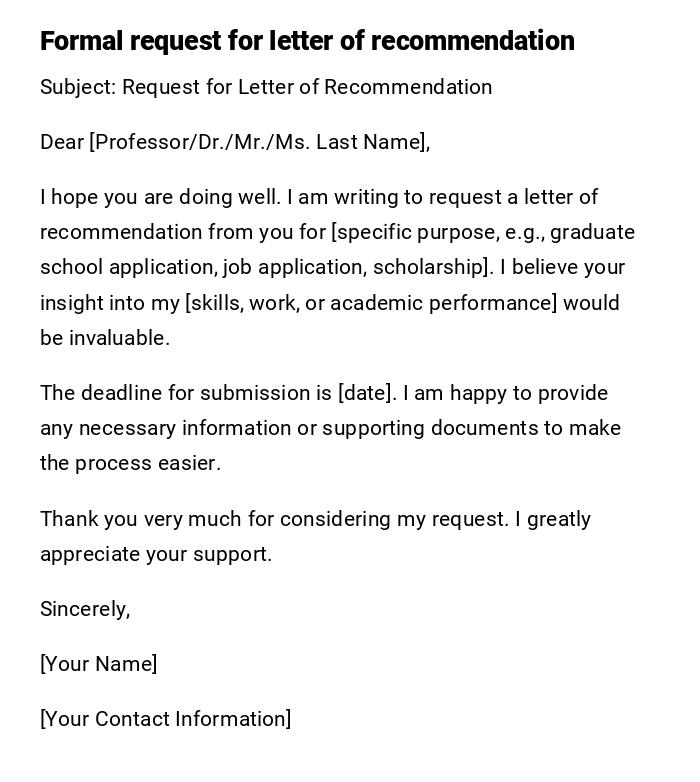
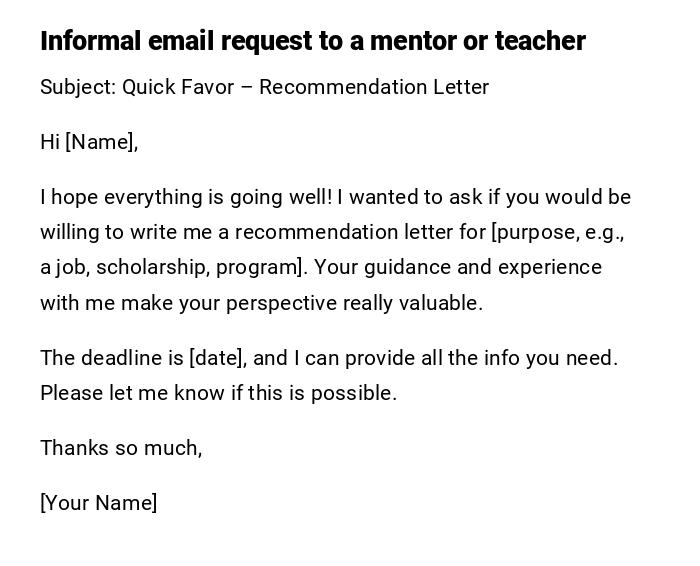
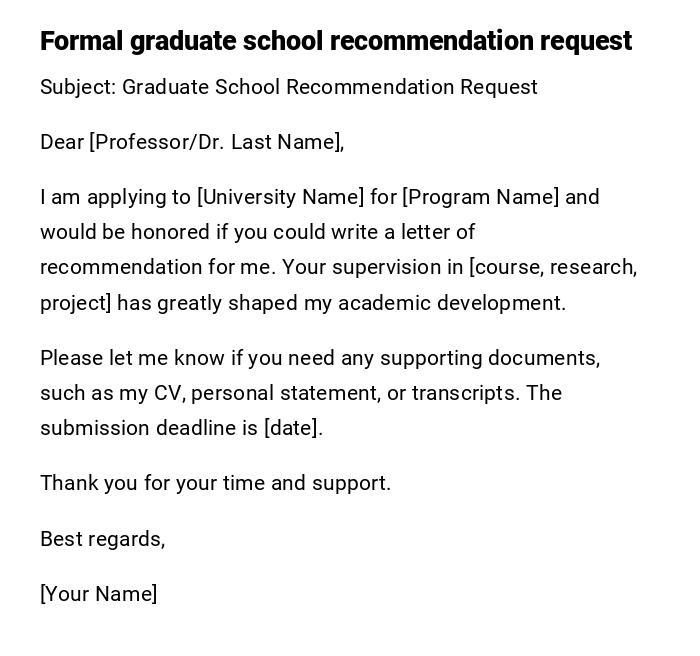
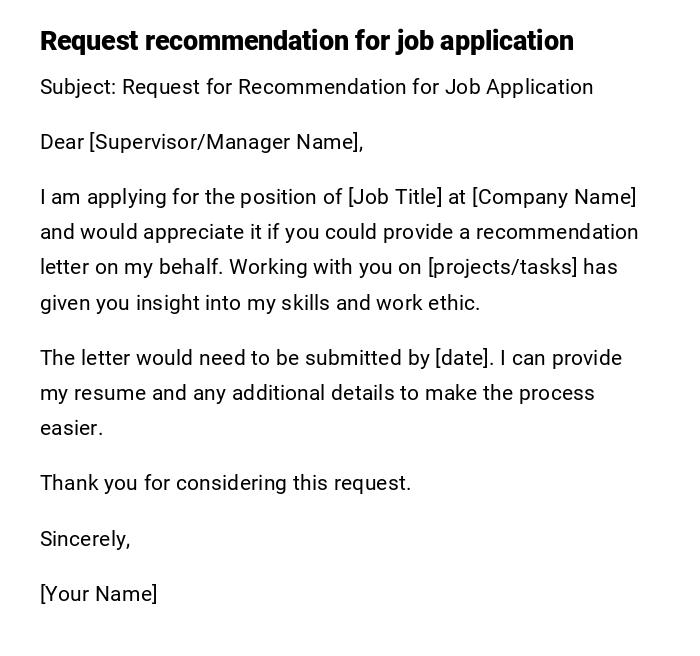
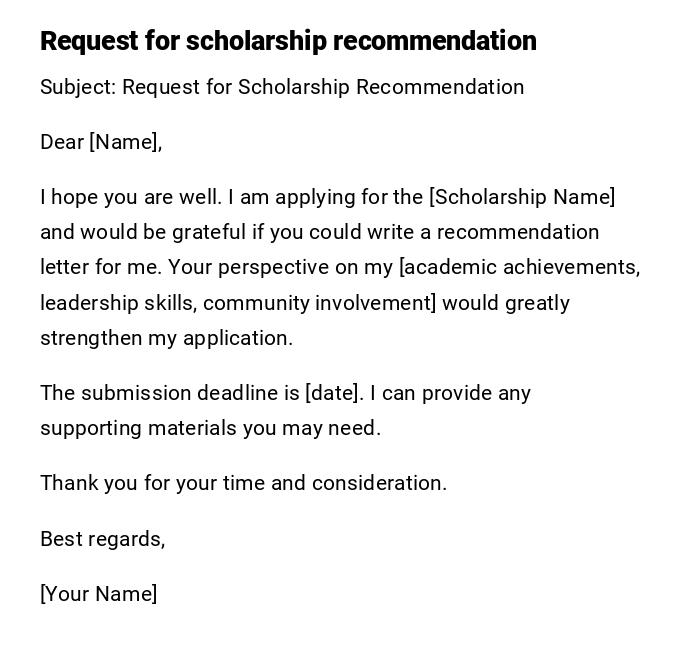
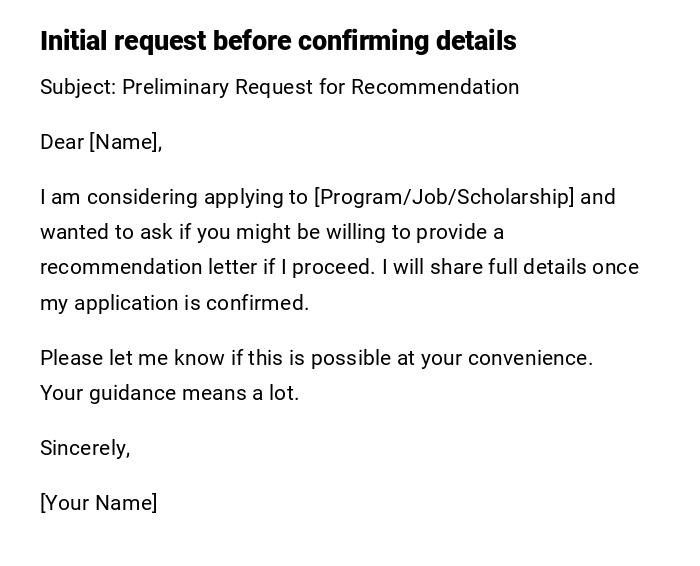

 Download Word Doc
Download Word Doc
 Download PDF
Download PDF